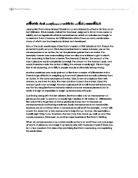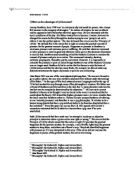Mill developed a system of higher and lower pleasures. He said there were general moral principles that should be followed, for example justice, honesty and truthfulness will intrinsically create pleasure. Mill split the body into different sections. He said the head was for human reason, the chest was for virtue (feelings) and the rest of the body was for the appetites, for desire. He said that we aiming to pleasure the mind, that the head should rule your heart all of the time. Mill said we should aim for the higher pleasures at the top of the body than the lower pleasures.
Mill maintained that the pleasures of the mind were higher than those of the body. There’s a link between the body and the mind because for us to be able to enjoy poetry or art, we need to eat and drink in order to survive. Mill believed that to pursue bodily pleasures like to eat and drink was not a high objective as those that are intellectually challenging. He said if we are confronted with the choice between the pleasures of the body or the pleasure of the mind, the pleasure of the mind is preferred.
We have all got the potential to reach the pleasure o the mind, but it is more difficult to get to as we are tempted by the rest of the body. The pleasures of the rest of the body are more tempting that the pleasure of the mind, even though the pleasure of the mind are easier to get to, the pleasure of the mind last longer. The pleasures of the mind however are much more pure and the extent of the mind is better.
J.S Mill argued that utilitarianism fitted in with Christianity. He said there was a positive place for rules in society. He said that truth was the greatest rule for society, the greatest way to secure happiness for society. He didn’t agree with the hedonic calculus which is way of telling if an action will cause you more pain of pleasure.
Part B
Mills version of utilitarianism is morally unacceptable. Discuss.
Mills version of utilitarianism can be seen as morally acceptable because utilitarianism is an organisational theory and can be used by the government and can be used by organisations. People will see this as a good thing because the government want to do what is best for society and for the general public’s happiness and so does utilitarianism.
Utilitarianism is also can be easy to regulate. This may be seen as morally acceptable as it can be easy to get people to abide by it and it can also make the majority of the public happy. This would make it seem acceptable as utilitarianism want the majority of the public to be happy.
However it may be seen as morally unacceptable because the concept of happiness is too broad. How do we define happiness? It means something different to every person. Another difficulty with utilitarianism is that of comparing happiness among different people. It depends on our ability to tell what will make someone happy.
Utilitarianism has been criticized for only looking at the results of actions, not at the desires or intentions which motivate them, which many people also consider important. An action intended to cause harm but that inadvertently causes good results would be judged equal to the result from an action done with good intentions. However, many utilitarian’s would argue that utilitarianism applies not only to results, but also to desires and dispositions praise and blame, rules, institutions, and punishment. For instance, bad intentions may cause harm to the person doing the act and to others even if they do not result in bad acts. Once this is recognized, supporters argue that utilitarianism becomes a much more complex, and rich, moral theory, and may align much more closely with our moral intuitions.
Since utilitarian’s judge all actions by their ability to maximize good consequences, any harm to one individual can always be justified by a greater gain to other individuals. This is true even if the loss for the one individual is large and the gain for the others is marginal, as long as enough individuals receive the small benefit. Thus, utilitarian’s deny that individuals have inviolable moral rights. This seems problematic to many critics of utilitarianism, one of whom notes that according to utilitarianism there is "nothing intrinsically wrong with sacrificing an important individual interest to a greater sum of lesser interests. That assumption is retained in the foundations of the theory, and it remains a source of moral concern.
I there fore think that utilitarianism is morally unacceptable as it is hard to see if it an action does cause pleasure for the majority.







